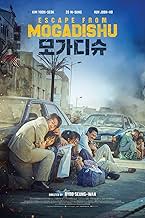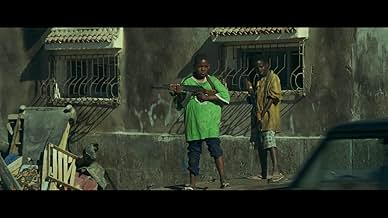VALUTAZIONE IMDb
7,0/10
7722
LA TUA VALUTAZIONE
Nella Somalia devastata dalla guerra, il personale e le famiglie delle ambasciate sudcoreane e nordcoreane hanno lo stesso obiettivo: fuggire da Mogadiscio.Nella Somalia devastata dalla guerra, il personale e le famiglie delle ambasciate sudcoreane e nordcoreane hanno lo stesso obiettivo: fuggire da Mogadiscio.Nella Somalia devastata dalla guerra, il personale e le famiglie delle ambasciate sudcoreane e nordcoreane hanno lo stesso obiettivo: fuggire da Mogadiscio.
- Premi
- 29 vittorie e 20 candidature totali
Zo In-sung
- Kang Dae-jin
- (as In-Sung Jo)
Huh Joon-ho
- Rim Yong-su
- (as Joon-ho Huh)
Joo Bo-bi
- Baek Hwa-si
- (as Bo-Bi Joo)
Ahn Se-ho
- Secretary Jang Ri-cheol
- (as Se-ho Ahn)
Trama
Lo sapevi?
- QuizOfficial submission of South Korea for the 'Best International Feature Film' category of the 94th Academy Awards in 2022.
Recensione in evidenza
It is 1991, and Somalia is under the iron grip of President Barre's military junta. The good-humoured Han Shin-sung is the South Korean Ambassador, who is often at odds with his North Korean counterpart Rim Yong-su. Shin-sung has a meeting scheduled with President Barre, for which his recently arrived underling Kang Dae-jin has brought gifts from South Korea. However, en-route, they are robbed, missing the meeting. Shin-sung suspects Yong-su, though before he can investigate further, a violent civil war breaks out, forcing the North and South Korean diplomats and embassy staff to work together if any of them are to survive.
A tense thriller, Ryu Seung-wan's 'Escape from Mogadishu' is a powerful treatise about ideology and the human cost of war. Written by Seung-wan and Lee Ki-cheol, their narrative contends that ideological differences must be set-aside in certain situations in order to ensure the well-being of those involved. In the context of the film, the South and North Koreans understand they must transcend their cultural and political divisions- such as their contrasting views on democracy, communism and reunification- if they are to survive; an uneasy task, but one they strive to do nevertheless.
Conversely, the film also reveals the commonalities the two sides share, such as their language, history and humanity. Seung-wan and Ki-cheol's screenplay challenges the prejudices that the characters have about each other, showing acutely how these are gradually overcome through mutual understanding and respect. In this way, it offers a rare glimpse into the nuanced relationship between the two Koreas, which is often oversimplified or ignored by the mainstream media.
The representation of the Korean sides stands in contrast with the brutality of the Somali warlords and militias, who have no regard for the lives of their own people. While the Koreans want to ensure their peoples safety, the Somalis are portrayed as bloodthirsty bandits. Both Barre's men- and those engaging in the uprising- murder and loot with impunity. As the Koreans attempt to escape the barbarity, the true cost of warfare is revealed. It is not Barre, nor the leaders of the uprising, who suffer- it is the common man and woman in the street.
Choi Young-hwan's cinematography is rich in texture and highly realistic. His atmospheric utilisation of differing colours heightens the contrast between the South and North Koreans, as well as with the Somalis, while the variety of camera angles he employs compounds the films tension and drama. Moreover, his use of aerial footage adds perspective to proceedings, while his close ups and shaky camera movements bolsters the action and emotional impact of scenes. Similar in ways to Rodrigo Prieto's work on Ben Affleck's 'Argo,' Young-hwan's handling of the film's visuals is consistently impressive.
Bang Jun-seok's emotive score creates urgency and panic, complementing the narrative astutely; particularly in the last act. Furthermore, Kim Bo-mook's production design is immersive and evocative, making locations look both real and lived-in. Bo-mook's work also compounds the contrast between the South and North Koreans, as does Rabiaa N'Gadi's set decoration and Hyein Ki's art direction. Additionally, Chae Kyung-hwa's costume design is striking, adding to the personalities and cultural backgrounds of the characters.
Kim Yoon-seok stars as Shin-sung, opposite Huh Joon-ho as Yong-su and Zo In-sung as Dae-jin. Yoon-seok impresses greatly, bringing much warmth and depth to the role, making the character instantly likable. Joon-ho delivers a nuanced performance as Yong-su, showing the forbidden humanity of a North Korean government official subtly and with much tact. In-sung is similarly good as the sturdy Dae-jin, while supporting stars Koo Kyo-hwan, Kim So-jin and Kim Jae-hwa cannot be faulted.
In conclusion, Ryu Seung-wan's 'Escape from Mogadishu' is an exciting and poignant examination of ideology, within the context of a civil war not often portrayed in film. Its narrative is compelling and insightful, while the cinematography from Choi Young-hwan continually impresses. Boasting a fine score, detailed production and set design- as well as powerhouse performances from all in the cast- this is one film you'll never want to escape from.
A tense thriller, Ryu Seung-wan's 'Escape from Mogadishu' is a powerful treatise about ideology and the human cost of war. Written by Seung-wan and Lee Ki-cheol, their narrative contends that ideological differences must be set-aside in certain situations in order to ensure the well-being of those involved. In the context of the film, the South and North Koreans understand they must transcend their cultural and political divisions- such as their contrasting views on democracy, communism and reunification- if they are to survive; an uneasy task, but one they strive to do nevertheless.
Conversely, the film also reveals the commonalities the two sides share, such as their language, history and humanity. Seung-wan and Ki-cheol's screenplay challenges the prejudices that the characters have about each other, showing acutely how these are gradually overcome through mutual understanding and respect. In this way, it offers a rare glimpse into the nuanced relationship between the two Koreas, which is often oversimplified or ignored by the mainstream media.
The representation of the Korean sides stands in contrast with the brutality of the Somali warlords and militias, who have no regard for the lives of their own people. While the Koreans want to ensure their peoples safety, the Somalis are portrayed as bloodthirsty bandits. Both Barre's men- and those engaging in the uprising- murder and loot with impunity. As the Koreans attempt to escape the barbarity, the true cost of warfare is revealed. It is not Barre, nor the leaders of the uprising, who suffer- it is the common man and woman in the street.
Choi Young-hwan's cinematography is rich in texture and highly realistic. His atmospheric utilisation of differing colours heightens the contrast between the South and North Koreans, as well as with the Somalis, while the variety of camera angles he employs compounds the films tension and drama. Moreover, his use of aerial footage adds perspective to proceedings, while his close ups and shaky camera movements bolsters the action and emotional impact of scenes. Similar in ways to Rodrigo Prieto's work on Ben Affleck's 'Argo,' Young-hwan's handling of the film's visuals is consistently impressive.
Bang Jun-seok's emotive score creates urgency and panic, complementing the narrative astutely; particularly in the last act. Furthermore, Kim Bo-mook's production design is immersive and evocative, making locations look both real and lived-in. Bo-mook's work also compounds the contrast between the South and North Koreans, as does Rabiaa N'Gadi's set decoration and Hyein Ki's art direction. Additionally, Chae Kyung-hwa's costume design is striking, adding to the personalities and cultural backgrounds of the characters.
Kim Yoon-seok stars as Shin-sung, opposite Huh Joon-ho as Yong-su and Zo In-sung as Dae-jin. Yoon-seok impresses greatly, bringing much warmth and depth to the role, making the character instantly likable. Joon-ho delivers a nuanced performance as Yong-su, showing the forbidden humanity of a North Korean government official subtly and with much tact. In-sung is similarly good as the sturdy Dae-jin, while supporting stars Koo Kyo-hwan, Kim So-jin and Kim Jae-hwa cannot be faulted.
In conclusion, Ryu Seung-wan's 'Escape from Mogadishu' is an exciting and poignant examination of ideology, within the context of a civil war not often portrayed in film. Its narrative is compelling and insightful, while the cinematography from Choi Young-hwan continually impresses. Boasting a fine score, detailed production and set design- as well as powerhouse performances from all in the cast- this is one film you'll never want to escape from.
- reelreviewsandrecommendations
- 10 dic 2023
- Permalink
I più visti
Accedi per valutare e creare un elenco di titoli salvati per ottenere consigli personalizzati
- How long is Escape from Mogadishu?Powered by Alexa
Dettagli
- Data di uscita
- Paese di origine
- Sito ufficiale
- Lingue
- Celebre anche come
- Escape from Mogadishu
- Luoghi delle riprese
- Aziende produttrici
- Vedi altri crediti dell’azienda su IMDbPro
Botteghino
- Budget
- 24.000.000.000 KRW (previsto)
- Lordo Stati Uniti e Canada
- 346.271 USD
- Fine settimana di apertura Stati Uniti e Canada
- 112.788 USD
- 8 ago 2021
- Lordo in tutto il mondo
- 29.902.716 USD
- Tempo di esecuzione2 ore 1 minuto
- Colore
- Mix di suoni
- Proporzioni
- 2.35 : 1
Contribuisci a questa pagina
Suggerisci una modifica o aggiungi i contenuti mancanti

Divario superiore
What was the official certification given to Fuga da Mogadiscio (2021) in Spain?
Rispondi



























